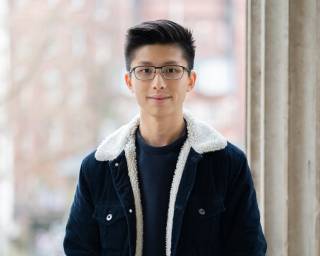"If you find that the data science pathway seems daunting, don’t be worried; I felt the same way at the beginning of the course. The modules are all taught assuming no prior knowledge of statistics"
 Before UCL
Before UCL

What were you doing before you became a student at UCL?
Prior to studying at UCL, I completed a dual diploma programme in Hong Kong comprised of the International Baccalaureate Diploma and the Ontario Secondary School Diploma, during which the core subjects I focused on were Geography, Biology, and Chemistry.
Your time at UCL
What attracted you to study Population Health at UCL?
My initial exposure to the study of epidemiology during my high school Biology course, as well as the demographic and epidemiological transitions in my Geography course helped to develop my interest in these topics and prompted me to delve deeper into the subject matter. My interest eventually led me to discovering Population Health at UCL, which being one of the few courses of its type at an undergraduate level, coupled with the university’s world-leading research, made choosing this course an easy choice. How Data Science is integrated into the course on the Data Science Pathway made the course particularly appealing, as it opens countless doors for potential careers in the future given the growing demand of such a skillset.
What’s the best thing about your programme?
The interdisciplinary nature of the course allows us to explore a wide range of topics across population health. One day could be spent learning about how a social determinant of health; such as social-economic position, may influence a range of health outcomes; such as increased rates of diabetes or cardiovascular disease. Another day could be spent looking at the effect the introduction of antibiotics has had on the health of populations globally, as well as the challenges that we as a society will have to face in the future due to its overuse. The readings being comprised of up to date research papers on each topic further enhances content from lectures has been a great change from the use of conventional textbooks as well.
What can a student expect to learn on this course?
The content covered in the course encompasses a few key areas; public health interventions, social theory, statistics, and research methods. Lectures in the epidemiological transition model will take students from the history of population health, through to modern day health interventions such as vaccinations, with the development of such interventions and the global demographic and epidemiological transitions being explored in between. How a range of social determinants such as employment and disability affect health outcomes will also be delved into. This is in conjunction with the methodology for measuring such health outcomes and the statistical methods involved in interpreting and visualising them, particularly on the Data Science Pathway.
What is it like studying in London and how do you think it’s benefited your studies?
Studying in London has opened me up to a range of internship opportunities specific to the city, with countless spring week and summer internships available for students to apply for. Easy access to all areas around London via the Underground also opens up many opportunities for both volunteer and paid work as well, with myself taking up part time volunteer work at one of Cancer Research UK’s branches in my spare time. There are countless opportunities for you to meet new friends and activities to do as well in London, whether it be a society led event, watching one of the many theatre shows at the West End, or even having a fun night and practicing your spare game at the local bowling alley.
Life after UCL
What are your career plans once you’ve completed your current studies at UCL?
I would like to further my studies by pursuing a Master’s Degree in a subject allied with Public Health or Epidemiology and eventually become involved with either research or disease prevention initiatives post-study.
Student wisdom
What piece of advice would you give to new students?
If any of you find that the data science pathway seems daunting, don’t be worried; I felt the same way at the beginning of the course. The modules are all taught assuming no prior knowledge of statistics and scientific research from students. In addition, despite the steep learning curve the programming software R that you will be learning, as long as you are willing to commit to some practice in your spare time, the guidance received is sufficient for anyone to succeed in learning it. For those still unconvinced, in spite of mathematics being my least favourite subject in high school, learning R has been one of my favourite parts of the course. This is because with the instantaneous feedback you receive from the software when you make a mistake, you will rarely be put into frustrating situations where you spent 15 minutes on a question, only to find out later on that you made a mistake in one of your initial steps.
Lastly, ask as many questions as possible during your lectures as well! Your lecturers will often be professionals in the specific topic being discussed, so make sure you get the most out of your time with them as you can.
 Close
Close

